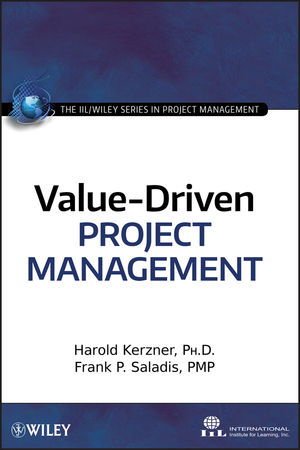|
Textbook
Value-Driven Project ManagementISBN: 978-0-470-50080-4
Hardcover
288 pages
August 2009, ©2009
 This is a Print-on-Demand title. It will be printed specifically to fill your order. Please allow an additional 10-15 days delivery time. The book is not returnable.
|
||||||
Preface vii
Acknowledgments xi
International Institute for Learning, Inc. (IIL) xii
Chapter 1: HOW PROJECT MANAGEMENT HAS CHANGED 1
Why Traditional Project Management May Not Work 2
Today’s View of Project Management 8
Changing Views of Project Management 16
Recognizing the Need for Change 46
Chapter 2: CHANGING OUR DEFINITION OF PROJECT SUCCESS 49
Changing Times 50
Not Meeting the Triple Constraint 52
Defining Project and Program Success 54
Redefining the Triple Constraint Success Criteria 56
Definition of Success 58
Chapter 3: THE IMPORTANCE OF VALUE 61
Success 62
Types of Value 64
Return on Investment (ROI) 66
Types of Business Values 68
Changing Values 70
Chapter 4: THE STAKEHOLDERS’ VIEW OF VALUE 103
Stakeholder Perception 104
Classification of Stakeholders 106
The Sydney, Australia, Opera House 108
Apple’s Lisa Computer 112
Denver International Airport 116
Balancing Stakeholders’ Needs 120
Traditional Conflicts over Values 122
Project Management Value Conflicts 124
Value Perceptions within a Project 126
Chapter 5: THE COMPONENTS OF SUCCESS 129
Four Cornerstones of Success 130
Categories of Success 132
Categories of Values 134
Deciding on the Quadrant 138
Internal Values 140
Financial Values 142
Future Values 144
Customer-Related Values 146
Reasons for Internal Value Failure 148
Reasons for Financial Value Failure 150
Reasons for Future Value Failure 152
Reasons for Customer-Related Value Failure 154
Antares Solutions 156
General Electric (Plastics Group) 158
Asea Brown Boveri (ABB) 160
Westfield Group 162
Computer Associates Technology Services 164
Convergent Computing 166
Motorola 168
Automotive Suppliers Sector 170
Banking Sector 172
Commodity Products (Manufacturing) Sector 174
Large Companies 176
Small Companies 178
Chapter 6: SUCCESS AND BEST PRACTICES 181
From Values to Best Practices 182
Two Components of Success 184
Redefining Value Metrics (CSFs and KPIs) 186
The Need for Changing Metrics 188
Project Management Office Involvement 190
Discovery of Best Practices 192
The Debriefing Pyramid 194
Disclosure of Best Practices 196
Levels of Success in Obtaining Values 198
Project Management Knowledge 200
Project Management Benchmarking 202
Sharing Values during Benchmarking 204
Intellectual Property Cost versus Value 206
Implementation Failures 208
Chapter 7: THE VALUE CONTINUUM 211
The Timing of Values 212
The Value Continuum 214
Barriers along the Continuum 216
Activities to Speed Up the Value Continuum 218
The Value Continuum and the Project
Management Maturity Model 220
Value Management Life-Cycle Phases 222
Value Identification Phase: Business Case 224
Business Drivers Phase: Business Drivers 226
Measurement Phase: Key Performance Indicators 228
Value Realization Phase: Value (Benefits) 230
Customer Satisfaction Management Phase:
Continuous Improvement 232
Chapter 8: ASSIGNING VALUE THROUGH OBJECTIVES 235
Types of Performance Reports 236
Benefits and Value at Completion 238
Determining Benefits (Value) at Completion 240
Establishing the Business Objectives 242
Estimating Approaches 246
Project Plans 248
Business Plans 250
Canceling Projects 252
Marrying Project and Program Management 254
Chapter 9: VALUE LEADERSHIP AND SENIOR MANAGEMENT 257
The Evolution of Leadership 258
Measurements and Triggers 260
What Executives Want to Hear 262
Critical Issues for the Selling Process 264
Threats that Executives Face 266
Project Management Success versus Maturity 268
Conclusions 270
Index 273



